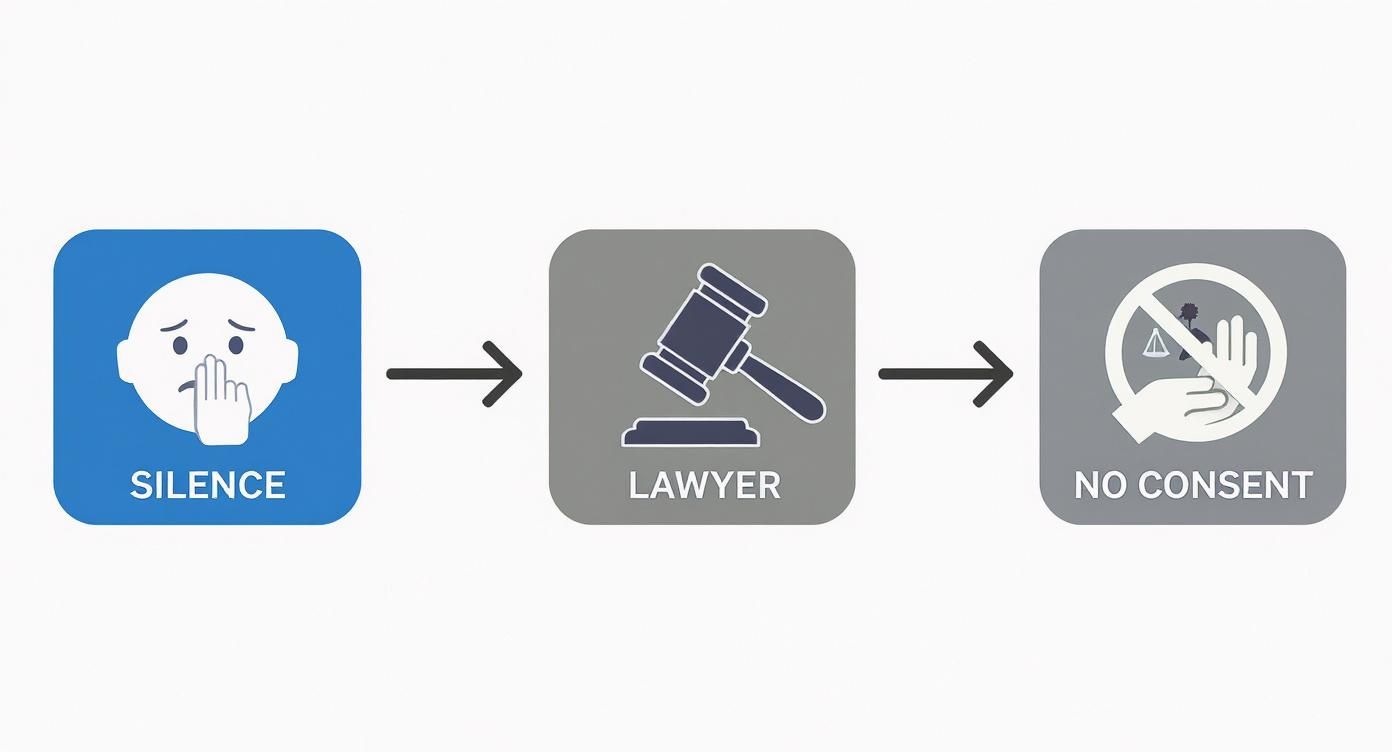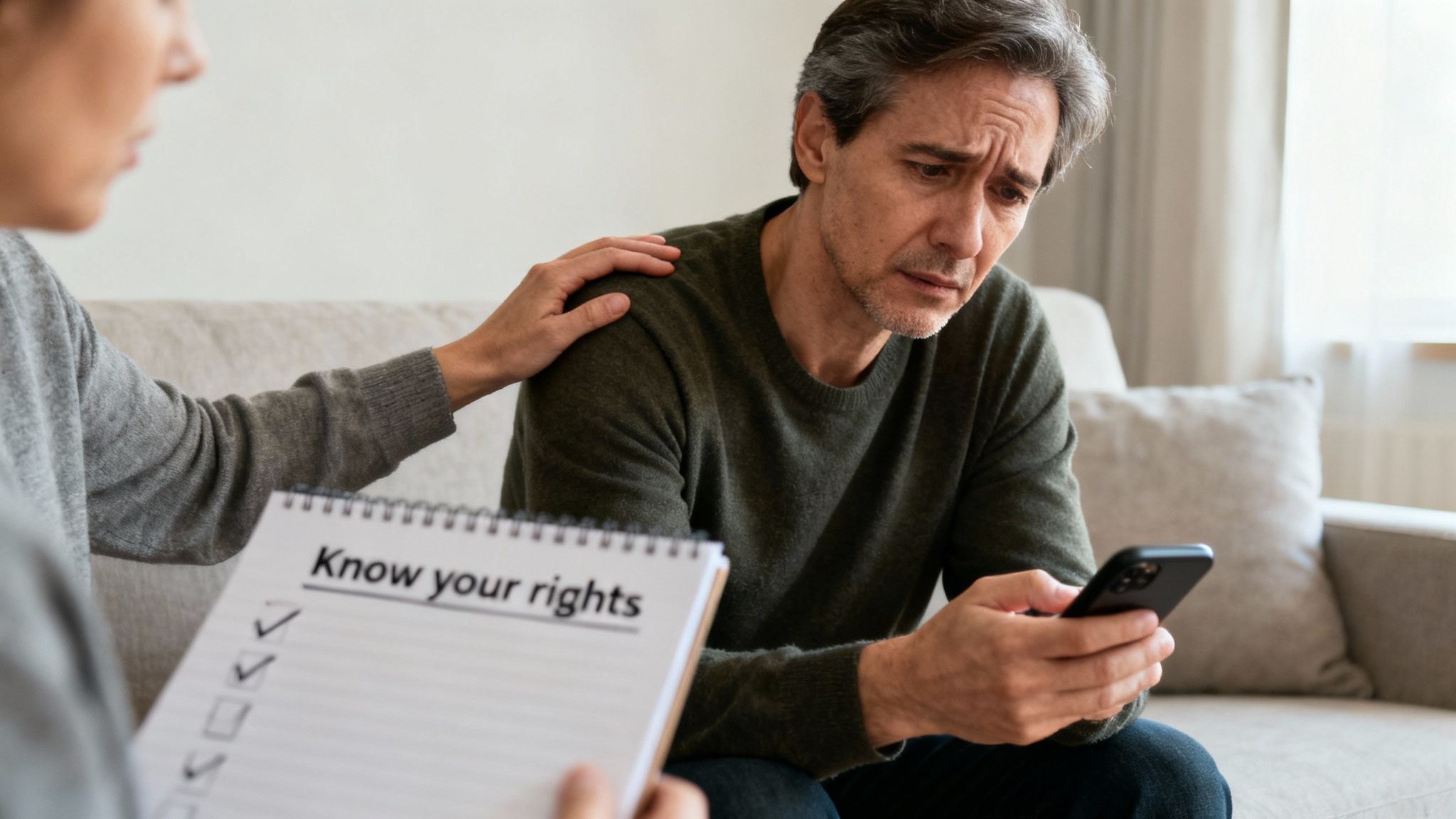The moment you or a loved one is accused of a crime is completely disorienting. It might be a jarring phone call in the middle of the night or the sudden arrival of law enforcement at your door, turning your world upside down. For Texas parents, this fear is often doubled by the terrifying possibility that a criminal charge could trigger an investigation by Child Protective Services (CPS), threatening to tear your family apart. In those first few hours, it feels like the ground is shifting beneath your feet. It's easy to feel like the story has already been written and you have no say in the ending.
We want you to know: this is not the end. The road toward getting criminal charges dropped starts the second you interact with law enforcement. It’s not about finding some obscure legal trick; it's about understanding and protecting your fundamental rights. The choices made in this initial window can dramatically affect the strength of the prosecution's case and open up opportunities for a dismissal later on, protecting both your freedom and your family.
Facing an Arrest: Your First Protective Steps
When you're trying to get criminal charges dropped in Texas, the most critical moves happen right after an arrest. Your top priorities? Invoking your right to remain silent, making it clear you won't answer questions without a lawyer present, and refusing to consent to any searches of your property or person. These first steps are your constitutional shield, stopping you from accidentally giving the prosecution the very ammunition they need to use against you.
This infographic breaks down the crucial protective steps to take immediately after an arrest.

This visual guide drives home the foundational trio of a strong initial defense: silence, legal counsel, and refusing consent.
Your Immediate Actions Matter
The most common mistake people make is trying to talk their way out of the situation. They genuinely believe that if they just cooperate and tell their side of the story, the police will see the light and let them go.
Unfortunately, this almost never works. Anything you say can—and absolutely will—be used against you, even comments you think are helping your case.
Invoking your right to remain silent is your most powerful shield. You simply need to state, "I am exercising my right to remain silent, and I would like to speak with my attorney." After you've said that, say nothing else. This isn't an admission of guilt; it's a right guaranteed by the Constitution to prevent your words from being twisted or taken out of context.
The actions you take—or fail to take—in the first 24 hours can set the entire trajectory of your case. Asserting your rights immediately is the single most important step toward a favorable outcome, including a potential dismissal.
Similarly, law enforcement might ask for your consent to search your phone, your car, or your home. You are not required to give it. You can politely but firmly say, "I do not consent to a search." If they have a warrant, they can proceed, but your refusal preserves your attorney's ability to challenge the legality of that search down the road.
To make this crystal clear, here’s a quick guide on what to do and what to avoid in those first moments.
Immediate Actions After an Arrest in Texas
| What You Should Do | What You Should Avoid |
|---|---|
| Clearly state, "I am invoking my right to remain silent." | Answering any questions about the alleged incident. |
| Immediately ask for a lawyer. | Trying to explain your side of the story to police. |
| Firmly but politely say, "I do not consent to any searches." | Giving consent to search your phone, car, or home. |
| Stay calm and be cooperative with basic identification. | Lying or providing false information to officers. |
| Remember details of the arrest and interactions. | Arguing with or resisting the arresting officers. |
| Contact an experienced attorney who understands both criminal and family law ASAP. | Speaking to anyone about your case except your lawyer. |
These foundational steps are non-negotiable for building a defense and creating the best possible chance to have charges dropped. For example, the issuance of an emergency protective order in Texas can often follow an arrest, making it even more vital to have a legal advocate on your side from the very beginning.
If you or a family member is facing criminal charges, the time to act is now. Contact The Law Office of Bryan Fagan for a free, confidential consultation to discuss your case and learn how we can protect your rights from day one.
How Prosecutors Decide to Drop a Case

Here’s one of the biggest myths I have to bust for clients: the idea that the alleged victim is in charge of the case. Families often come to me thinking that if the person who called 911 simply "takes it back," the charges will magically disappear.
That's just not how it works in Texas. Once an arrest is made, the case isn't "Victim vs. You" anymore. It's "The State of Texas vs. You." The prosecutor at the District Attorney's office is the one calling the shots, and their job is to represent the state—not the individual who made the initial complaint. They alone decide whether to push for a conviction, cut a plea deal, or drop the case completely.
Getting inside their head is the key to crafting a defense strategy aimed at a dismissal.
Uncovering Weaknesses in the State's Case
Let's be blunt: a prosecutor’s main job is to win. To do that, they have to prove guilt "beyond a reasonable doubt," which is the highest standard of proof in our legal system. If they look at the evidence file and don't feel confident they can convince a jury, they're much more likely to dismiss the charges. It’s a practical decision.
This is where a good defense attorney earns their keep. We don’t just sit back and wait for our day in court. We start digging immediately, challenging every piece of the state's evidence from day one. More often than not, the reasons a prosecutor drops a case fall into a few key areas:
- Insufficient Evidence: The entire case might hinge on one shaky witness or have zero physical proof. A classic "he said, she said" situation without anything to back it up is often too flimsy to risk taking before a jury.
- Procedural Errors by Law Enforcement: Cops have to play by the rules. If they conducted an illegal search of your car, failed to read you your Miranda rights before an interrogation, or botched the chain of custody for evidence, that evidence can get thrown out. A solid motion to suppress can gut a prosecutor's case before trial even begins.
- Witness Issues: What happens if the star witness for the prosecution suddenly moves out of state? Or if they change their story? Or worse, what if we uncover that their key witness has a history of lying? Without credible testimony, their case can completely collapse.
A Real-Life Scenario
Let me paint a picture for you. Imagine a dad gets into a shouting match with another parent in the school pickup line. Things get heated, someone calls the police, and an assault charge gets filed. On paper, it looks like a simple case. The father is terrified, not just about a criminal record, but about how CPS will view this when they inevitably get a call.
But then we start investigating. We discover the only "evidence" is the word of the other parent, who we find has a documented history of making false accusations. On top of that, we track down a bystander who no one else bothered to talk to, and they confirm our client was actually defending himself.
Once we present all of this to the prosecutor, their "slam dunk" case suddenly looks like a guaranteed loss at trial. The smart move for them? Dismiss it.
A criminal charge is just an accusation—it's not a final verdict. A prosecutor dropping a case is usually a business decision, a calculated choice based on the risk of losing in court. Our job as your attorney is to drive that risk sky-high by finding every single crack in their foundation.
This isn't just talk; the data backs it up. A huge number of cases get resolved long before a jury is ever selected. In the federal system, for instance, about 8.2% of all criminal cases were dismissed in 2022, many because of weak evidence or smart negotiations. This proves that with a strong defense, charges get dropped all the time. You can dig into more of the numbers in this Pew Research Center analysis.
Legal Strategies That Lead to a Dismissal
A proactive defense isn't about waiting for your day in court. It's about attacking the prosecution's case from day one, dismantling it piece by piece until there's nothing left to stand on. For families in Texas caught in the terrifying grip of the criminal justice and CPS systems, simply waiting for a trial is never the right strategy. The real goal is to convince the prosecutor their case is a loser, forcing a dismissal long before a jury is ever selected.
An experienced attorney has a whole arsenal of tools to make this happen. These are proven, practical actions designed to shine a light on the fatal flaws in the evidence or the procedures used against you.
Challenging How Evidence Was Obtained
One of the most powerful ways to get criminal charges dropped is to go after the evidence itself. Every single one of us is protected by the U.S. Constitution from unreasonable searches and seizures. When law enforcement officers cross that line, any evidence they find can be tossed right out of court.
This is done by filing what's called a Motion to Suppress Evidence. If the judge agrees with the motion, they'll rule that the illegally obtained evidence is inadmissible—meaning the prosecutor can't use it at trial.
Think about a routine traffic stop. An officer searches a car without a warrant and without the proper legal justification, known as probable cause. If they turn up something illegal, a successful Motion to Suppress would block that evidence from ever seeing the inside of a courtroom. Without their star piece of proof, the prosecutor's case often crumbles, leading straight to a dismissal. This is also a huge deal in cases where evidence could be used against you in other legal fights, like those involving CPS. You can learn more about how evidence like drug tests intersects with your rights in our detailed guide on CPS drug tests and your rights in Texas.
Undermining the Arrest Itself
Another potent tactic is to attack the legality of the arrest from the very beginning. For an officer to make an arrest, they must have probable cause—a solid, reasonable belief that a crime was committed. If your attorney can show the officer didn't have enough justification to make that arrest, the whole case can be thrown out.
This means digging into every single detail. We're talking about scrutinizing the police report for inconsistencies, analyzing every second of body camera footage, and finding the contradictions in the officer's own story. If the very foundation of the case—the arrest—is legally shaky, everything built on top of it collapses.
A strong defense is built on offense. It’s about methodically taking apart the prosecutor's case piece by piece, starting with the initial police interaction and ending with the evidence they plan to use against you.
Presenting Proof of Innocence Early
Sometimes, the most direct path to a dismissal is simply proving the prosecutor has the wrong person. This isn't about waiting to tell your side of the story to a jury. It's about gathering and presenting exculpatory evidence—proof that points directly to your innocence—as early as humanly possible, often before a grand jury even gets the chance to indict.
Let's walk through a real-world scenario. A family member is accused of stealing from their job. The whole case rests on a coworker's statement and some grainy, unclear security footage.
Instead of sitting back and waiting, our first move would be to immediately gather:
- Dated receipts showing your loved one was miles away when the theft happened.
- GPS data from their smartphone or vehicle that confirms their location.
- Credible alibi witnesses who can vouch for where they were.
By packaging this compelling evidence and presenting it directly to the prosecutor, you completely change the game. You’re no longer just poking holes in their weak case; you're handing them undeniable proof of innocence. Any reasonable prosecutor, faced with that kind of evidence, will almost always choose to dismiss the charges rather than waste taxpayer money pursuing a wrongful prosecution.
Paths to Dismissal Without a Trial

Sometimes, the best way to get criminal charges dropped isn’t a knock-down, drag-out fight in the courtroom. It’s through a program focused on rehabilitation. For a lot of people, especially first-time offenders, Texas law offers pathways that prioritize a second chance over a permanent conviction.
This is where the justice system shows a more compassionate side. These alternatives acknowledge that a single mistake shouldn't torpedo a person's entire future, offering a concrete way to earn a dismissal and let families move forward without the lifelong weight of a criminal record.
Pre-Trial Diversion and Deferred Adjudication
Two of the most common and powerful options you'll encounter are Pre-Trial Diversion (PTD) programs and deferred adjudication. They work a bit differently, but both can lead to the same incredible outcome: getting the charges against you dismissed completely.
Think about a young adult from a good family who makes a bad call and gets caught with a small amount of marijuana. Instead of facing a conviction that could derail scholarships and job prospects, they might be a perfect candidate for a PTD program.
At its core, a PTD program is basically a contract with the prosecutor's office. You agree to do certain things, and they agree to drop the case when you’re done.
The terms of these programs usually look something like this:
- Completing a period of supervision without any new arrests.
- Attending required counseling or educational classes.
- Putting in a set number of community service hours.
- Passing regular drug tests.
Once you’ve successfully checked all the boxes, the prosecutor formally dismisses the case. It’s a true dismissal, giving you a clean slate and the opportunity to later seek an expunction to permanently destroy the arrest record.
These alternative resolutions are not a sign of weakness; they are a strategic and often life-changing way to resolve a case. They demonstrate that the Texas legal system has avenues that focus on recovery, accountability, and preserving a person's future.
Deferred adjudication is similar, but it’s a bit more formal. It involves pleading "guilty" or "no contest" to a judge, who then puts off a finding of guilt and places you on community supervision (what most people call probation). If you complete the probation successfully without any issues, the case is dismissed, and you are never formally convicted of the crime.
Who Qualifies for These Programs?
Getting into one of these programs isn’t automatic. Eligibility depends on several key factors, like the specific offense, the county where the charge was filed, and your own criminal history. As you might expect, they are most often offered for non-violent, lower-level offenses.
This entire approach is also shaped by bigger trends in the justice system. For decades, many Western countries have seen significant drops in overall crime rates, which impacts court dockets and prosecutors' priorities. This shift can make them more open to dropping charges for smaller offenses through diversion programs. You can read more about these historical trends in this overview of the global crime drop.
This is where an experienced attorney can make all the difference. They can negotiate effectively with prosecutors, showing them exactly why you are an ideal candidate for one of these programs and framing it as a win for both you and the state.
Protecting Your Family During a Criminal Case
When one person in a family is accused of a crime, it’s never just their problem. That accusation sends shockwaves through the entire household. Suddenly, a storm of fear, confusion, and anxiety can feel completely overwhelming.
This is especially true when a criminal charge triggers a parallel investigation from Child Protective Services (CPS).
You’re no longer just fighting to clear a name; you’re fighting to keep your family together. A pending charge can be used as a weapon in family court, complicating custody battles and giving CPS investigators leverage to intervene in your life. Navigating this terrifying intersection where criminal law and family law collide is one of the toughest challenges a parent can face.
The Overlap of Criminal Charges and CPS Cases
Imagine this scenario: a parent gets into a heated argument with an ex-partner during a child exchange. It escalates, and now they're facing a misdemeanor assault charge. Almost immediately, CPS gets a report claiming the children are in an unsafe environment.
Just like that, this parent is being pulled in two different directions, fielding interviews and demands from both law enforcement and a CPS caseworker.
This is where things get incredibly complicated. What you say to one can absolutely be used in the other. A defensive comment to a caseworker could undermine your criminal defense, while an admission in the criminal case could be the very thing CPS uses to justify removing your children under Chapter 262 of the Texas Family Code. If the situation isn't resolved, it can even lead to the termination of parental rights under Chapter 161. It's critical to present a united, responsible, and legally protected front. Having an attorney who understands how these two legal worlds impact each other isn't just a benefit—it's a necessity. If you find yourself in this situation, you can learn more about what to do if you are wrongfully accused by CPS in our detailed guide.
Systemic Challenges and the Need for Strong Advocacy
We also have to acknowledge a difficult reality: the system isn’t always fair. Research shows that racial disparities can influence how charges are pursued and whether they are dropped.
Communities of color often face greater hurdles in the justice system due to systemic biases in everything from legal representation to prosecutorial decisions. This isn't just a talking point; it's a lived experience for many families.
This reality underscores the vital need for every family to have skilled, aggressive, and culturally competent legal advocacy. Your lawyer must be prepared to challenge biases and ensure your story is heard fairly—both in the criminal courtroom and in any related family court proceedings.
To ensure your family's financial and legal matters are handled, especially when life gets chaotic, consider setting up important documents like creating a Durable Power of Attorney. This can provide a crucial layer of stability during an unpredictable time. Protecting your family requires a comprehensive strategy, one that anticipates challenges and safeguards your rights at every single turn.
Questions Texas Families Ask About Dismissals

When your family gets tangled up in the justice system, the unknown is terrifying. You're suddenly drowning in urgent questions and need clear, straightforward answers—not confusing legal jargon. Our goal is to replace that confusion with clarity and give you a steady hand during one of the toughest times of your life.
Below, we’ll tackle some of the most common questions and concerns we hear from Texas families fighting to get criminal charges dropped.
Can the Person Who Called the Police Drop the Charges?
This is probably one of the biggest and most persistent myths in criminal law. The short answer is no.
Once the police get involved and make an arrest, it's no longer in the hands of the individual who made the call. In Texas, criminal charges are brought by the State, and the District Attorney's office is the one calling the shots.
That said, the alleged victim's wishes still carry a lot of weight. If they make it clear to the prosecutor that they don't want to press charges and won't cooperate with the case, it can significantly weaken the state's position. This lack of cooperation is often a key reason a prosecutor decides to dismiss the charges.
How Long Does It Take for a Charge to Be Dropped?
There’s no magic number here. The timeline for a dismissal can vary dramatically—it could be a matter of weeks, or it might drag on for many months. It all boils down to the unique facts of your case.
Several things can speed up or slow down the process:
- Case Complexity: A straightforward case with obvious weak evidence might get tossed out fairly quickly.
- Prosecutor’s Caseload: Let's be real, D.A. offices in big counties like Harris or Dallas are swamped. Backlogs are common.
- Your Attorney’s Strategy: An aggressive defense that gets to work early filing motions and challenging the evidence can definitely speed things up.
If there's a clear constitutional issue, like an illegal search, a dismissal can happen relatively fast. But more tangled cases will require months of investigation, negotiation, and patience.
One of the most common and heartbreaking misunderstandings is believing a dismissal erases everything. The arrest, the mugshot, and the court filings remain on your record, visible to employers and landlords, until you take the next step.
Does a Dropped Charge Disappear from My Record?
This is a critical point that too many people miss: a dismissal does not automatically clear your record. Even when the charges are gone, the record of the arrest itself remains public information.
The only way to truly wipe the slate clean is through a completely separate legal process called an expunction. An expunction is a court order that legally destroys the records of the arrest, allowing you to deny it ever happened. For some cases that don't qualify for expunction, an order of nondisclosure can seal the record from public view.
Getting that expunction is the final, essential step to fully reclaim your good name after getting criminal charges dropped.
The road to a dismissal is paved with legal hurdles and emotional stress, especially when your family's future is on the line. You don't have to walk it alone. The experienced attorneys at The Law Office of Bryan Fagan understand the stakes in both criminal court and CPS cases. We are here to protect your rights, answer your questions, and fight for the best possible outcome for your family. For a free and confidential consultation to discuss your case, contact us today through our website.




